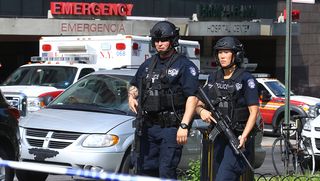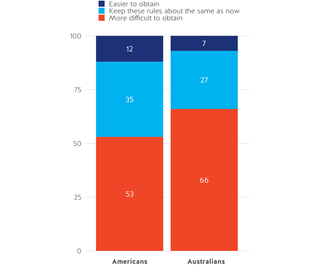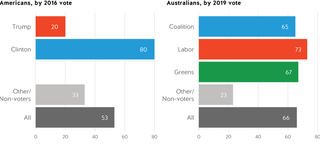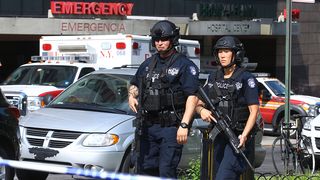Since the 1990s, violent crimes and homicides have declined substantially in the United States. However, mass shootings have defied this trend.
In 2019, there has been more than one mass shooting per day, and as of November 19, 45 school shootings in the US — almost one per week up to that point of the year.
Many Australians repeatedly ask themselves why the US has not been able to respond to these tragedies the way we did after the Port Arthur massacre: by imposing sensible restrictions on gun ownership and reducing the number of guns in circulation.
The similar response of the New Zealand Government to the Christchurch mosque attack catalysed discussion in the United States, again showing the scope for strong and comprehensive reforms within a democratically elected government.
We can't blame America's 'frontier spirit'
Several Democratic primary candidates have since backed sweeping reforms, particularly after the El Paso and Dayton shootings.
Likewise, the Democrat-controlled House of Representatives has passed a raft of legislation to strengthen gun laws.
But the Senate has not been moved.

The resistance of successive presidential administrations and Congress collectively to seriously attempt to restrict gun ownership (with the Clinton assault weapons ban, now expired, an exception) is often put down to the frontier spirit of the American people: their libertarian streak that prefers small government and individual freedom, even if it comes at a cost.
On its face, this seems to be a plausible argument.
However, a deeper dig into the topic suggests this is not the case.
What does the polling say?
To learn more about American attitudes towards gun control, and other issues, the United States Studies Centre and YouGov polled 1,800 Americans in late July, and asked them a range of questions about their political and policy preferences.
We also surveyed 1,820 Australians, asking them many of the same questions, allowing us to compare public opinion in both countries.
The data we collected suggests that public attitudes towards gun control in America are not very different to what we see in Australia.
Most Americans surveyed wanted to make it harder to own firearms, not easier in their own country.
Just 7 per cent of Australians and 12 per cent of Americans said they want their federal government to make it easier for people to buy a gun, while 66 per cent of Australians and 53 per cent of Americans said they want it to be harder to buy a gun.
This was generally equal across young and old, rural and urban area, white and black. The policy status quo each is responding to is different.
Therefore the 93 per cent of Australians who said they want access to firearms to be harder, or remain the same, can all be considered to support stricter gun control measures in Australia than exist in the United States.

The partisan gap is real
One area the countries differed was partisan differences. Coalition, Labor and Greens voters were all roughly opposed to making guns easier to obtain.
Fewer than 10 per cent of the supporters of each party preferred this option, with the differences between them remaining within the margin of error.

A large majority of each parties' supporters preferred making guns more difficult to obtain.
According to our data, 73 per cent of Labor voters favoured this option, compared with 65 per cent of Coalition supporters.
In the US, the partisan split was much larger. While 80 per cent of respondents who voted for Hillary Clinton in 2016 supported making it harder to obtain firearms, just 20 per cent of Trump voters agreed.
A difference of 60 percentage points and 7.5 times the size of the partisan gap in Australia.
Even still, that means only about 21 per cent of Trump voters wanted guns to be easier to obtain, compared with 6 per cent of Clinton supporters.
The role of institutions
Our data suggests public opinion is unlikely to be the major reason for the lack of action on firearms.
A more likely explanation for the differences in policy settings between Australia and the US is the institutional differences between the two countries.
The status quo bias is embedded in the American system of government, making it particularly difficult to implement contentious policy changes.
This comes from the veto points in the American system: a directly-elected executive (the president); two legislative chambers (the House of Representatives and Senate) with equal power, combined with this external, powerful executive; an independent judiciary empowered by a very explicit constitution and a bill of rights (including the Second Amendment which explicitly provides for the right to bear arms); a highly decentralised federal system; and the power of interest groups.
While policy outcomes in the United States usually match public opinion, special interests can use these veto points to block policies they oppose.
They do this using superior organisation, access, money and public support.
The NRA has a wide reach
The National Rifle Association, which has frequently been blamed for a lack of action on gun control, possesses all four of these.
With millions of members, substantial funds and an army of well-paid lobbyists and campaigners, it is able to reach politicians (particularly Republicans) with promises of support or threats of opposition when it comes time for them to run for re-election.
While the term "special interests" is often used pejoratively, they include a politically diverse range of groups.
The competition between groups for resources has long been seen by social scientists to be the basis of representative democracy.
Besides business lobby groups and the NRA, these can also include trade unions, environmental groups and human rights organisations.
Don't hold your breath for gun control
What is unusual about the US is the strength of these groups and their ability to block legislation.
Part of this is about money. Compared to Australia, huge funds are involved in American politics.
In 2016, Clinton's presidential campaign raised approximately US$1.4 billion (between her own campaign, the Democratic Party and joint party fundraising and aligned outside groups).
Trump's campaign raised slightly less: a still impressive US$958 million.
Due to the partisan gap in opinion and institutional differences, it is unlikely that the US will experience an outcome similar to the Australian gun amnesty and buybacks.
Republicans are much more opposed than Coalition voters in Australia to these ideas, and Australia has never had an equivalent to the lobbying and campaigning juggernaut that is the NRA.







